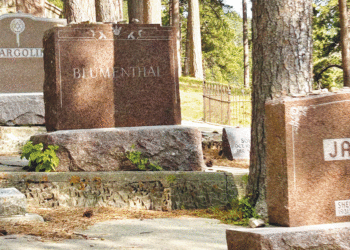J.J. Goldberg is a perspicacious longtime observer of the American Jewish community. A former editor and current columnist for the Forward, Goldberg recently blogged about the 1964 murder of three young Civil Rights workers — James Chaney, who was an African American from Mississippi, and Michael Schwerner and Andrew Goodman, who were Jews — by members of the Ku Klux Klan in Mississippi.
Goldberg wrote:
For some reason, the yahrzeit of the three has not become an annual memorial day on a Jewish calendar that’s packed with memorials for Jewish heroes and martyrs. Goodman and Schwerner should be counted among the most important heroes in American Jewish history. Perhaps some day we’ll know how to tell our own story. Maybe then our young will care enough to stick around.
And by the way, here’s a memo to anyone tempted to kvetch about defending our own people before worrying about others: Before the civil rights movement, Jews were kept from working in most industries, living in most neighborhoods and attending most colleges except under numerical quotas. The Civil Rights Act of 1964, passed in the emotional immediate aftermath of the murders, was drafted to outlaw discrimination “on the basis of race or religion.” We were fighting for ourselves.
In case you missed a salient sentence in the above quotation by Goldberg, I will repeat it: “Goodman and Schwerner should be counted among the most important heroes in American Jewish history.”
Indeed, the heroism of the young black and white activists who worked to register disenfranchised African Americans in Mississippi 50 years ago is a proud aspect of American history. And AJW readers should know that of the 700 students from northern campuses who joined the cause, a disproportionate number were Jews.
I think the twin strands of the Jewish prophetic tradition and Jewish involvement in movements for social justice informed the activism of many young Jews back then. I recall reading The Fire Next Time, by James Baldwin, which informed my sense of racial injustice in this country. And I did my little part selling “brotherhood buttons” — depicting a black and white handshake — door to door in Mendota Heights, to raise money for the Student Nonviolent Coordinating Committee (SNCC), one of the groups involved in what became known as Freedom Summer. The idyllic suburb was not as dangerous as the Mississippi countryside, but at least I ventured out and engaged my neighbors.
(I recommend that AJW readers watch the documentary Freedom Summer, which is part of the PBS “American Experience” series. It is an affecting account of the 10 weeks when students traveled to Mississippi to join organizers and local African Americans in an effort to dismantle the apartheid system in the South, the institutionalized regime of white supremacy known as Jim Crow.)
In his column in the July 4 edition of the Forward, Goldberg expands on his blog post, and suggests that the 12th of the Hebrew month of Tammuz, which corresponds to the date of the murders in Philadelphia, Miss., be added to our “sacred calendar” as “Civil Rights Heroes’ Day.” The date falls on July 10 this year.
Goldberg notes that the organized Jewish community, since the civil rights activism of the 1960s, has diverged from the concerns of American Jews, who mainly embrace “liberal values” as their Jewish identity.
Further, Goldberg suggests that the 16th of Tammuz (in the run-up to the mournful holiday of Tisha B’Av, which commemorates the destruction of the Temple, and other catastrophes) could become “a celebration of Diaspora Jewish social activism, the sweetness that we add, against all odds, to the sadness of the exile we’ll mourn tomorrow.”
Goldberg suggests: “There could be a special synagogue service, a home seder or community mobilization. We’d honor a current-day hero battling uphill for immigrants or abortion rights, the poor, autism. What’s important is to celebrate our engagement in making this country a better place, and honor the heroism of our martyred sons.”
In any case, the story of Chaney, Schwerner and Goodman, their lives and martyrdom to the cause of freedom, should be taught diligently to our children. As the Torah instructs us: “Justice, justice shall you pursue, that you may live, and inherit the land that the Lord your God is giving you” (Deut. 16:20).
— Mordecai Specktor / editor@ajwnews.com
(American Jewish World, 7.4.14)



















